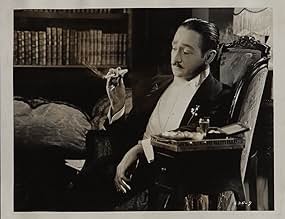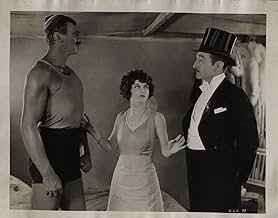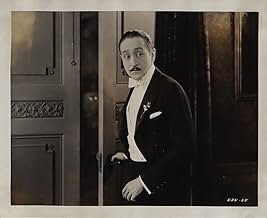Watched "Open All Night" (1924) with Viola Dana, Jetta Goudal, Adolphe Menjou, Raymond Griffith, Maurice 'Lefty' Flynn, Gale Henry, and others. You know, when it opens with the intertitle that reads something like "PARIS: city of love and bad marriages" (not exact, but you get the drift), that you're in for a story of something spoiling, if not going rotten. Well, Viola Dana is bored with her marriage to Adolphe Menjou because she thinks he's too soft (!), not tough enough with her, and that he respects her too much (!). He, on the other hand, is no angel. He loves his wife, yes, but... On a night when they plan to go out Dana finally says, "NO!", closes the door to her boudoir, and huffs... Menjou, with his typical nonchalance, goes out the door. Enter Gale Henry - with her new found, ah, companion - drunken Raymond Griffith (he's supposed to be funny) - who are supposed to go out with Dana and Menjou. Henry convinces Dana to go out, and they'll all go to the Parisian Velodrome where the last day of the six day bicycle race is going on. Here, Maurice 'Lefty' Flynn, a muscular man's man's man's man is winning all the heats. "He always wins". Jetta Goudal is in love with him. Meanwhile, Adolphe Menjou has already run into her somewhere else and through oily male maneuvering takes her to the Velodrome. By the night's end and the morning's passing and the race's end and a whole lot of goings on all is supposedly resolved.
Let me just say - if this were shown at a feminist's rally, the person showing the film would be strung up and hanged! It is so un-PC by today's standards that it needs to be seen to be believed. The end, for example, where Menjou has bruised the arm of Dana, and where he tries to assuage the incident by kissing the bruise, but she won't allow it because it's a badge of honor (!) - well, that's just a taste of some of the mentality of the picture. This was directed by Paul Bern, the same director who eventually married Jean Harlow, but under some still mysterious circumstances committed suicide just into the marriage.
Interesting to see another Viola Dana vehicle, though she's not as active in the film as beautiful Jetta Goudal. Menjou and 'Lefty' Flynn get most of the screen time - which wastes the time of Raymond Griffith - but that doesn't leave enough time to Dana, who only gets to react to the intertitles and Menjou. Maybe two and a half stars out of four, but beware from the beginning that the marriage code presented here is not only dated in a number of respects, but is male oriented to the point of feminist rebellion. Margaret woke up half way through this and wondered why I was watching it... I could feel her eyebrows go up even though I wasn't watching her... Thank goodness she was tired enough to fall back to sleep... I finished the film. Even my eyebrows were raised. Innocent, well, maybe the film was, but I'm not sure that's a proper word for this. Gentle, no. By today's standards incredibly dated. I wanted to like it, but I don't really think I did. It lacked the Lubitsch touch, a certain polish. Rather, it tripped over the furniture and bruised itself.






















